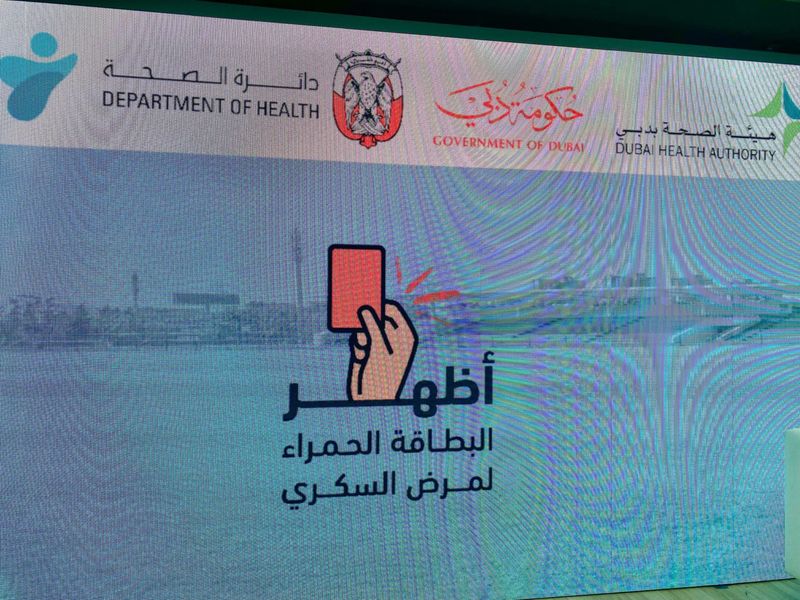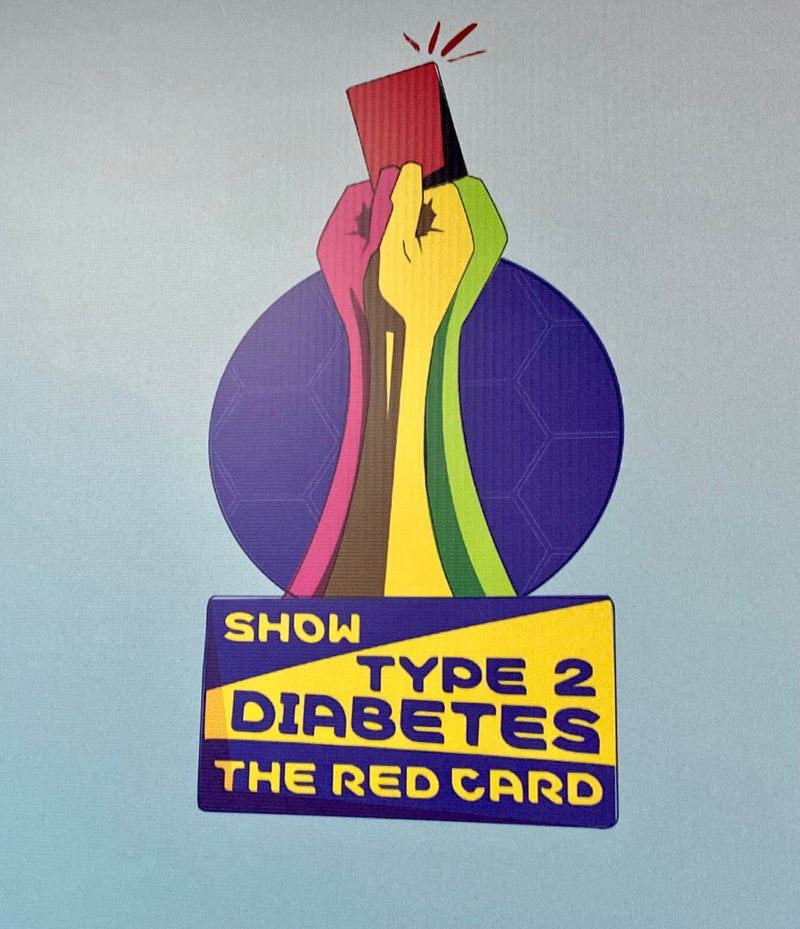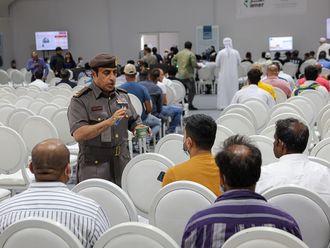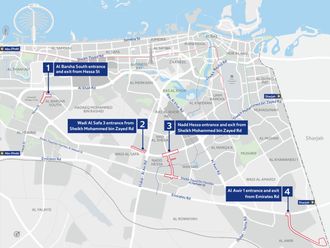
Dubai: The UAE on Thursday launched a nationwide screening and interventional campaign targeting prediabetic residents titled ‘Show the Red Card to Diabetes.’
The health authorities in the country have joined hands with private entities for the one-year battle to prevent diabetes occurring in prediabetic individuals by conducting mass free screening programmes at work places followed by intervention through lifestyle modification to reduce the risk factors for diabetes.
A new toll-free number (800DIABEAT) has been launched to facilitate screening programmes at workplaces apart from primary health centres across the country.
The Ministry of Health and Prevention (MoHAP) that announced the launch of the National Prediabetes and Diabetes Screening Programme aims to screen at least 5,000 residents in the first 100 days under the Government Accelerators Programme, officials revealed at a press conference.
“The launch of the National Prediabetes and Diabetes Screening campaign today is not just an announcement, it’s a commitment, a promise, and a testament to our unwavering efforts to uplift and uphold the standards of public health and foster preventive awareness within our community,” said Dr Hussain Abdul Rahman Al Rand, assistant undersecretary for the Public Health Sector at MoHAP.
How many people are prediabetic?
“It is noteworthy to mention that our collective efforts in this domain have indeed borne fruit, as evidenced by the remarkable reduction in diabetes prevalence to 11.81 per cent, as outlined in the 2018 National Health Survey findings,” he said.
However, the same survey also found that the prevalence of prediabetes in the country is 11.7 per cent of the population.
“So, if those prediabetic cases are not detected early, they can change to diabetics which will double the burden of the disease in the country,” said Dr. Buthaina Bin Belaila, head of the Non-Communicable Disease and Mental Health Department at MoHAP, while explaining the reason for launching the new campaign.
Read More
What will the campaign cover?
She said the campaign is characterised by targeting pre-diabetic patients and seeking to convert them to non-diabetic patients to achieve the campaign’s slogan, “Let’s expel diabetes from our lives.”
“We aim to early detect diabetes and its associated risk factors and thus provide advice and follow-up according to the approved national protocol over a period of six months.”
According to her, at least 80 per of those screened are likely to be referred to clinics to get advice on lifestyle changes and follow-up.
“We are following the National Diabetes Guideline which was being followed by all health entities. We are not using any medication, but only lifestyle changes for the first six months. After six months, there will be intervention according to that guideline and everybody should follow the guidelines,” she said.
Who should be screened?
Prediabetes is a serious health condition where blood sugar levels are higher than normal, but not high enough yet to be diagnosed as type 2 diabetes. Prediabetes puts you at increased risk of developing type 2 diabetes, heart disease, and stroke.
According to the US Centres for Disease Control and Prevention, more than 80 per cent of patients do not know they have it.
Dr Bin Belaila said any individual above the age of 18 with obesity or a family history of diabetes need to be screened. “If you don’t have these then from the age of 30 you have to go for screening.”
How can you get tested?
People can visit designated primary health centres in their neighbourhoods to get tested. The tests will be free for Emiratis while expats will be charged as per their insurance policies.
There will be mobile clinics to facilitate mass blood tests at major companies and workplaces. The campaign will encourage companies to arrange screening programmes at their premises by calling the toll-free number.
What test will be done?
During the campaign, the haemoglobin A1C (HbA1C) test will be provided to screen the individuals for prediabetes. The HbA1C test measures your average blood sugar level over the past three months. An A1C below 5.7 per cent is normal, between 5.7 and 6.4 per cent indicates you have prediabetes, and 6.5 per cent or higher indicates you have diabetes, according to the CDC.
What are the benefits of workplace screening?
The yearlong MoHAP and Merck Gulf initiative, which is also supported by UAE health authorities, BinSina chain of Pharmacies, Al Manzil Healthcare and Al Tadawi medical group, will engage the UAE population by targeting public and private sector workplaces.
Employees of workplaces participating in the campaign will be offered free screening, with digital risk assessment questionnaires followed by HbA1C tests for those at risk of prediabetes and diabetes.
The dedicated hotline 800DIABEAT also provides follow-up and answers the queries of those diagnosed with pre-diabetes or diabetes during the campaign with the aim of reversing prediabetes and improving the control of diabetes in those being screened.

How will the data help?
The results of the data will contribute to the preparation of a scientific paper that will be published internationally. These findings are anticipated to have a global impact, influencing global screening programme guidelines and enhancing post-diagnosis guidance, treatment, and care.
“One of the distinguishing features of the campaign is its commitment to nationwide data collection. Data collected from participants in this campaign will be analysed to test the effectiveness of the early detection and immediate intervention through lifestyle modification in reducing the risk factors and consequently the incidence of diabetes in the country in alignment with the UAE Centennial 2071,” said Dr Al Rand.
“By steering preventive and community health programmes, we aim not only to enrich the quality of life at the national level but also to forge a robust link between diabetes diagnosis and treatment,” he said, urging residents to pursue a healthy lifestyle with a balanced diet, adequate exercise and sleep.
“People should make use of the public health facilities like jogging tracks and cycling tracks across the country. They should take advantage of the good weather in the coming months to follow an active lifestyle with physical activities to prevent diabetes and other lifestyle disorders,” he added.Dr. Omniyat Al Hajri, executive
Dr. Omniyat Al Hajri, executive director of the Community Health Sector at Abu Dhabi Public Health Centre, Dr. Yousef Al Tair, director of Ibrahim Bin Hamed Obaidallah Hospital in Ras Al Khaimah, and chairman of the Diabetes Committee at the Emirates Health Services, Dr. Hend Al Awadhi, head of the Health Promotion and Education section of the Public Health Department at Dubai Health Authority, Dr. Kulaithem Al Mazrouei, medical director at the Primary Health Care Sector, Dubai Academic Health Corporation, and Ahmed Abo El Fadl, General Manager of Merck Gulf also spoke at the press conference.

Who is at risk of having prediabetes?
Being overweight
Being 45 years or older
Having a parent, or a sibling with type 2 diabetes
Being physically active less than 3 times a week
Ever having gestational diabetes (diabetes during pregnancy) or giving birth to a baby who weighed more than 9 pounds
Having polycystic ovary syndrome
Race and ethnicity are also a factor: African Americans, Hispanic/Latino Americans, American Indians, Pacific Islanders, and some Asian Americans are at higher risk.
Source: CDC








